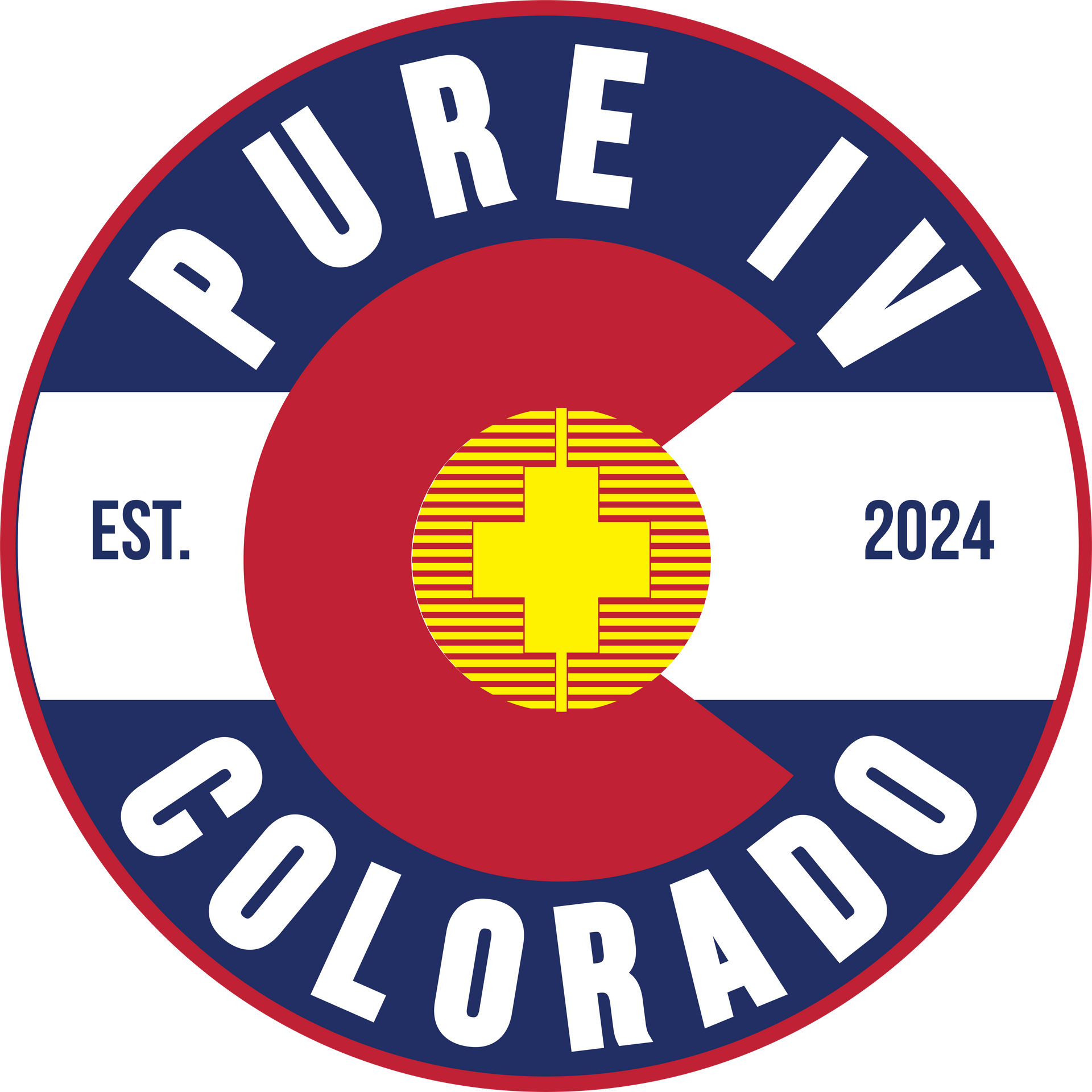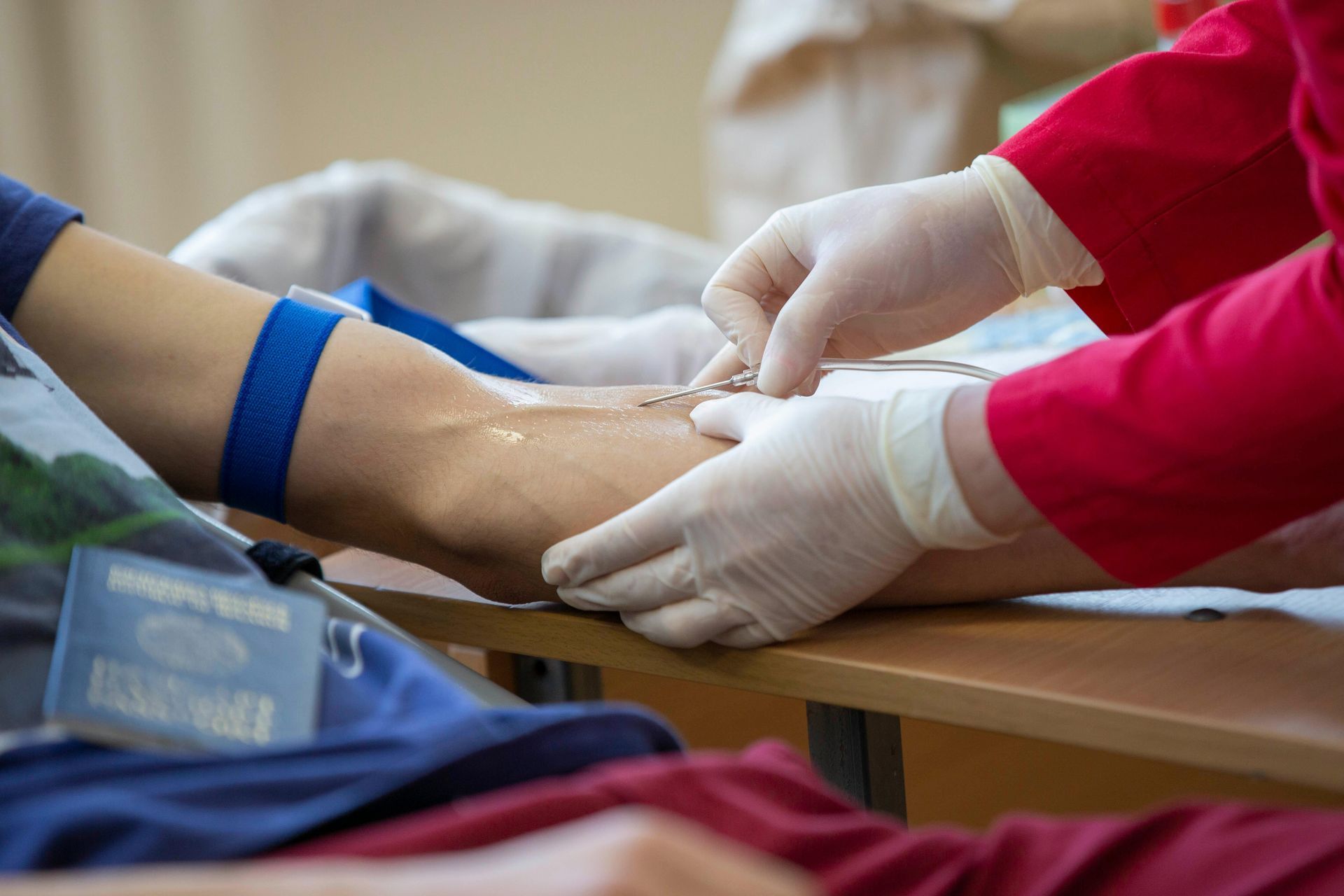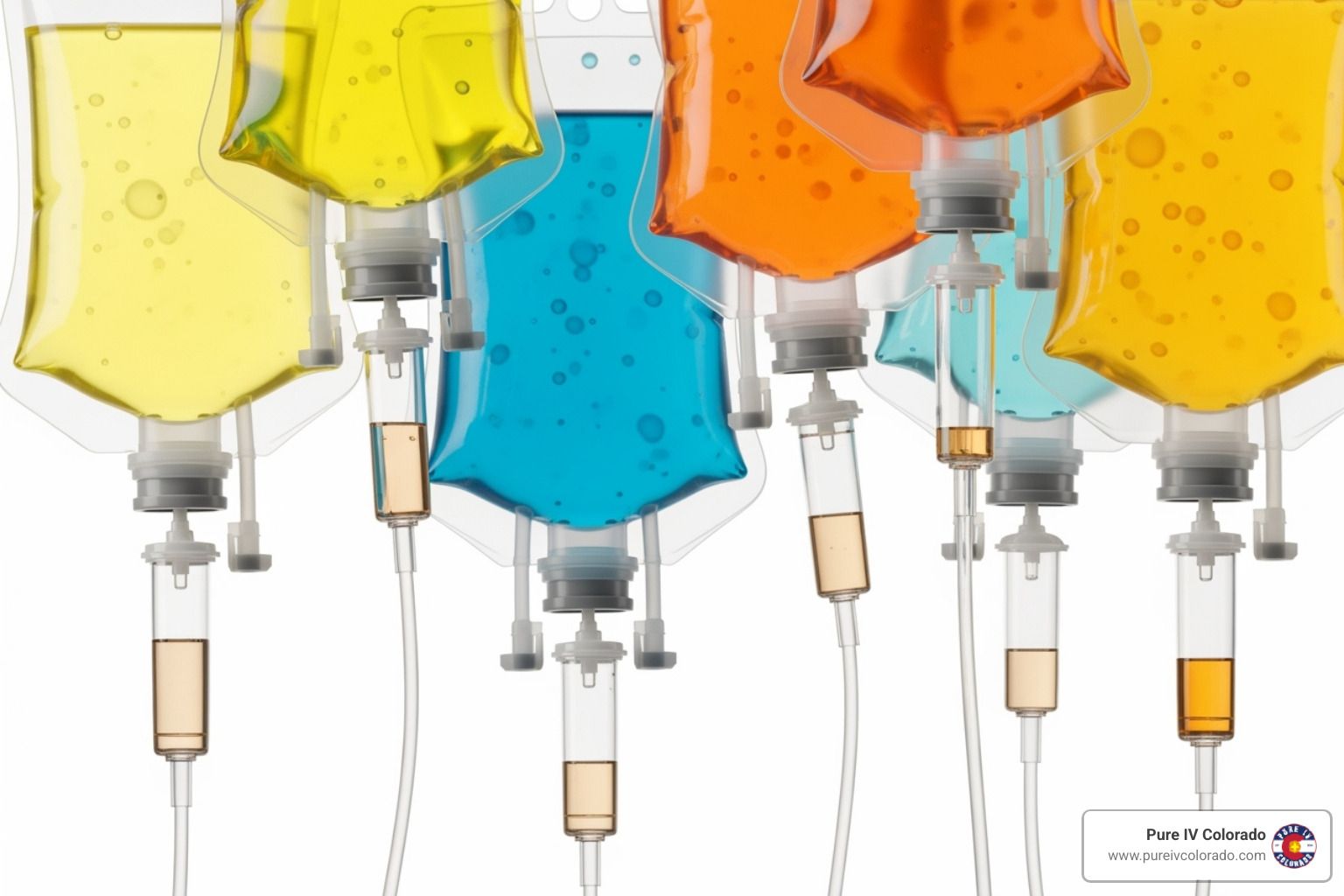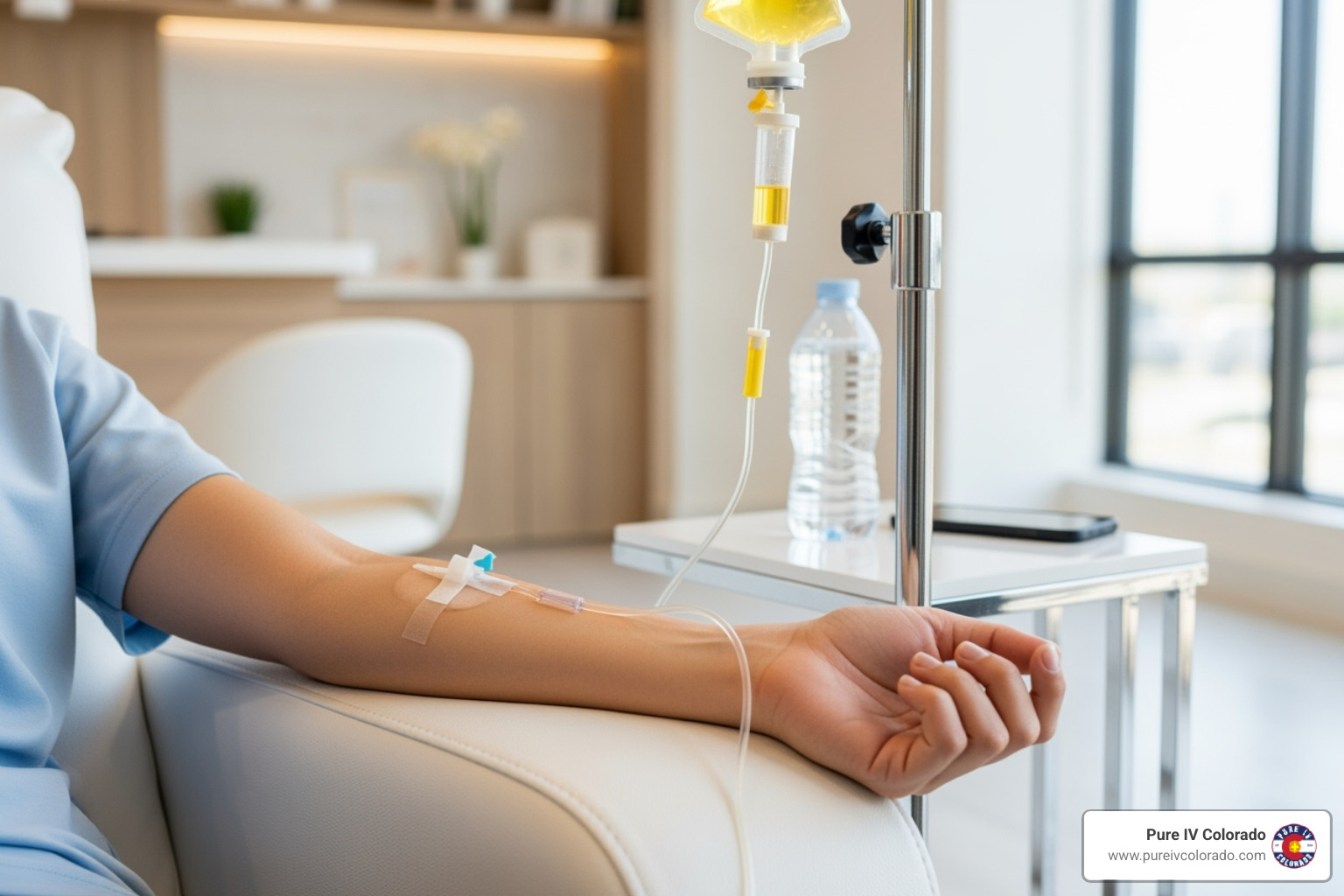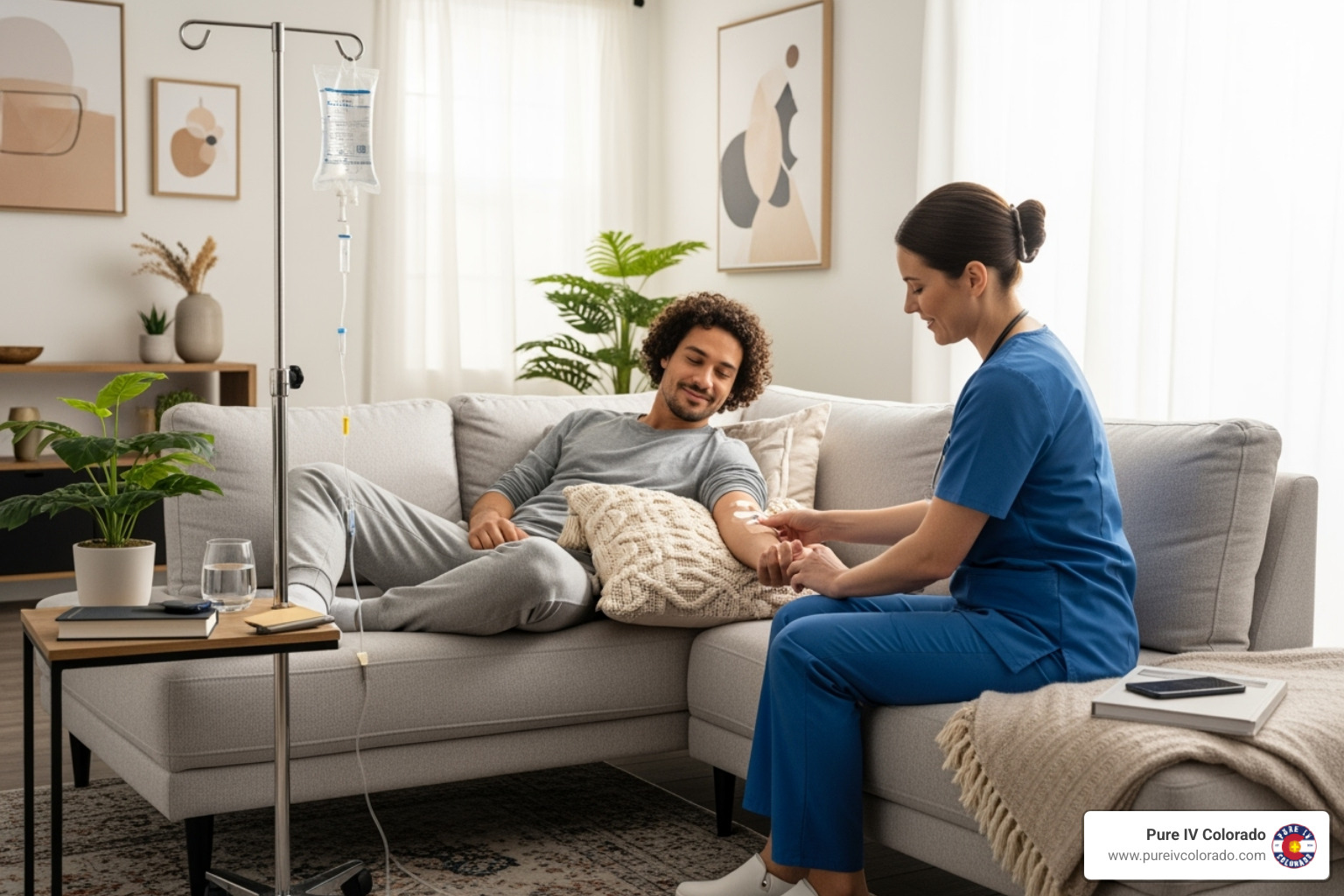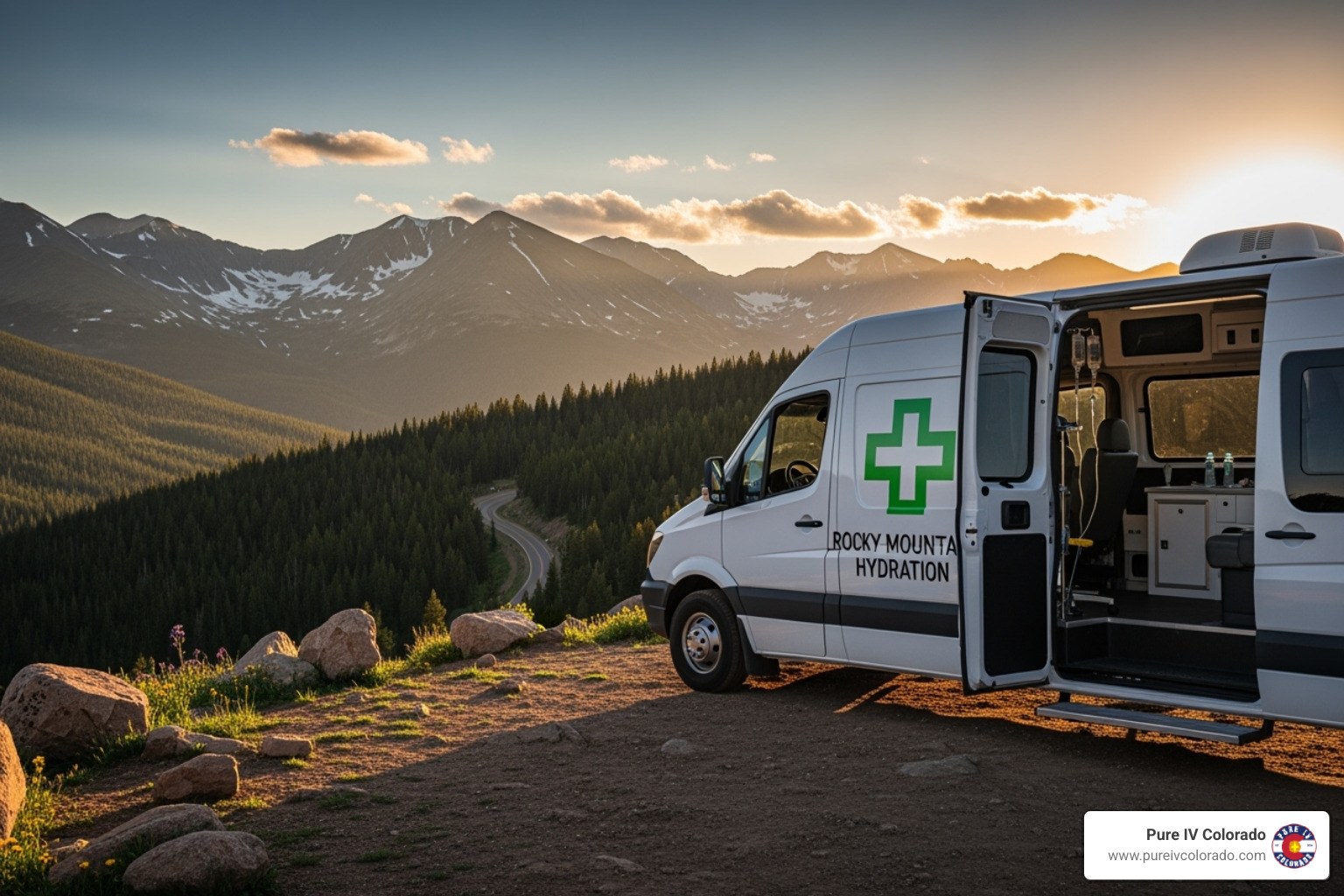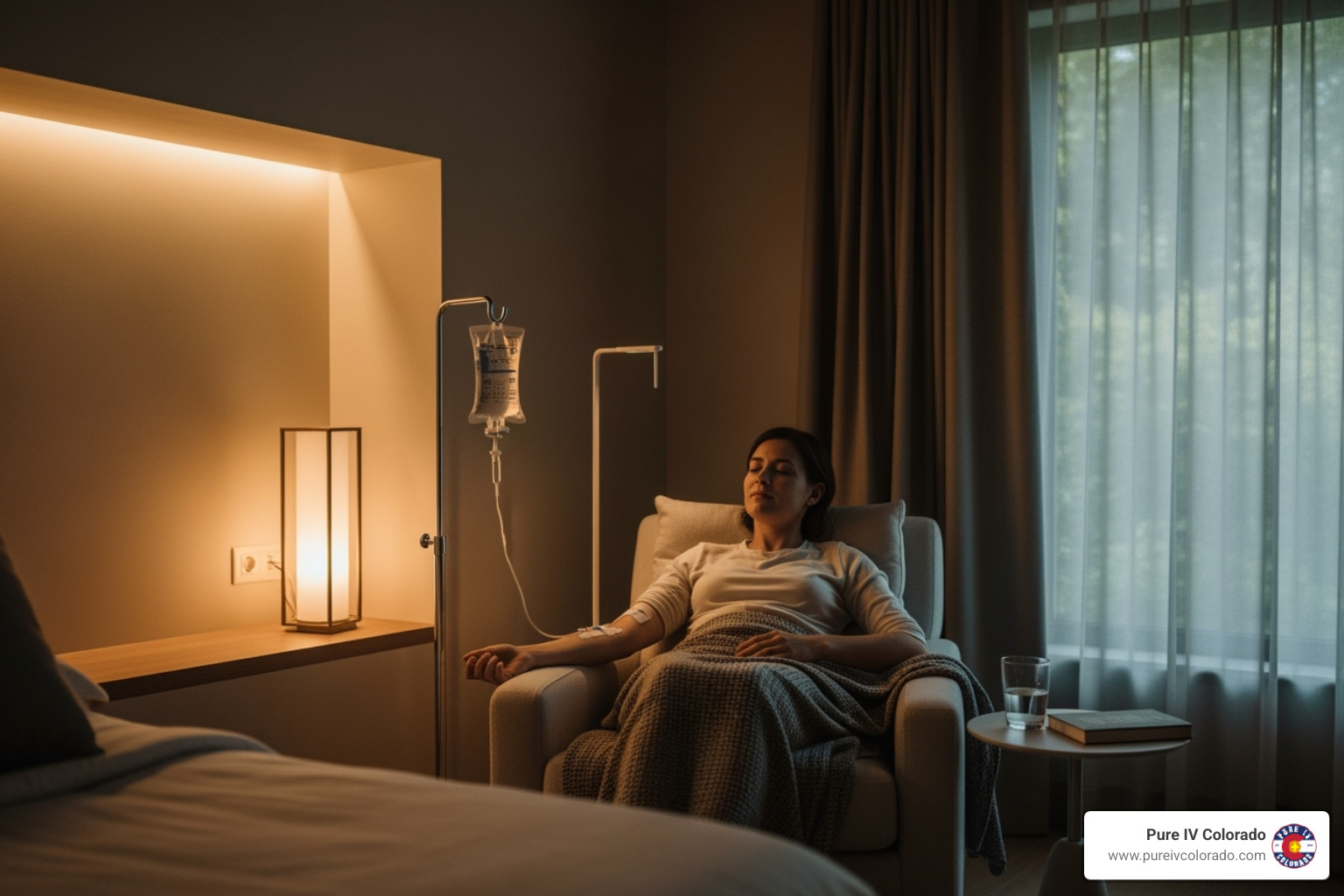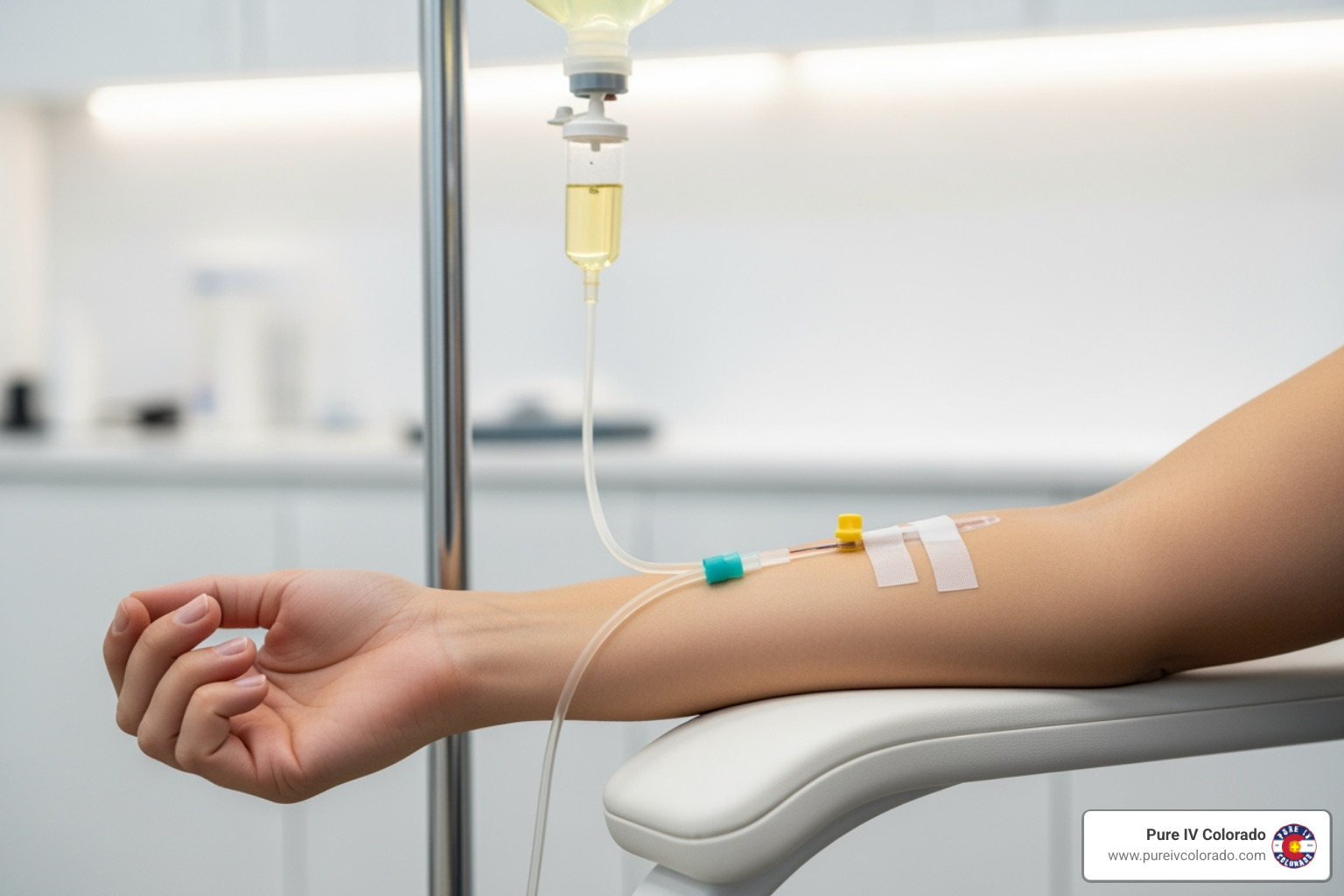Fast Relief for Food Poisoning: Essential Tips and Remedies
Why Quick Food Poisoning Relief Matters

Quick food poisoning relief starts with understanding what your body needs most during this uncomfortable illness. When nausea, vomiting, diarrhea, and stomach cramps hit - often within 2-6 hours of eating contaminated food - your body is working hard to eliminate harmful bacteria or toxins.
Here are the essential first steps for immediate relief:
- Rest your stomach - Avoid food and drink for the first few hours
- Start hydrating slowly - Sip water, ice chips, or clear broths in small amounts
- Don't fight the purge - Avoid anti-diarrhea medications initially as your body needs to eliminate toxins
- Get plenty of rest - Your immune system needs energy to fight the infection
- Seek help for severe symptoms - High fever, bloody stools, or inability to keep fluids down
Food poisoning affects approximately 1 in 6 Americans each year , making it one of the most common illnesses we face. While most cases resolve within 12-48 hours, knowing how to respond quickly can significantly reduce your discomfort and speed recovery.
The key is supporting your body's natural healing process while preventing dangerous dehydration - especially important at Colorado's high altitude where dehydration happens faster.
I'm Joseph Lopez PIVC , founder of Pure IV Colorado, and I've helped hundreds of clients recover from food poisoning through personalized mobile IV therapy and wellness education. My experience in emergency hydration and nutrient replacement has shown me that quick food poisoning relief depends on immediate, targeted care that addresses both symptoms and underlying dehydration.
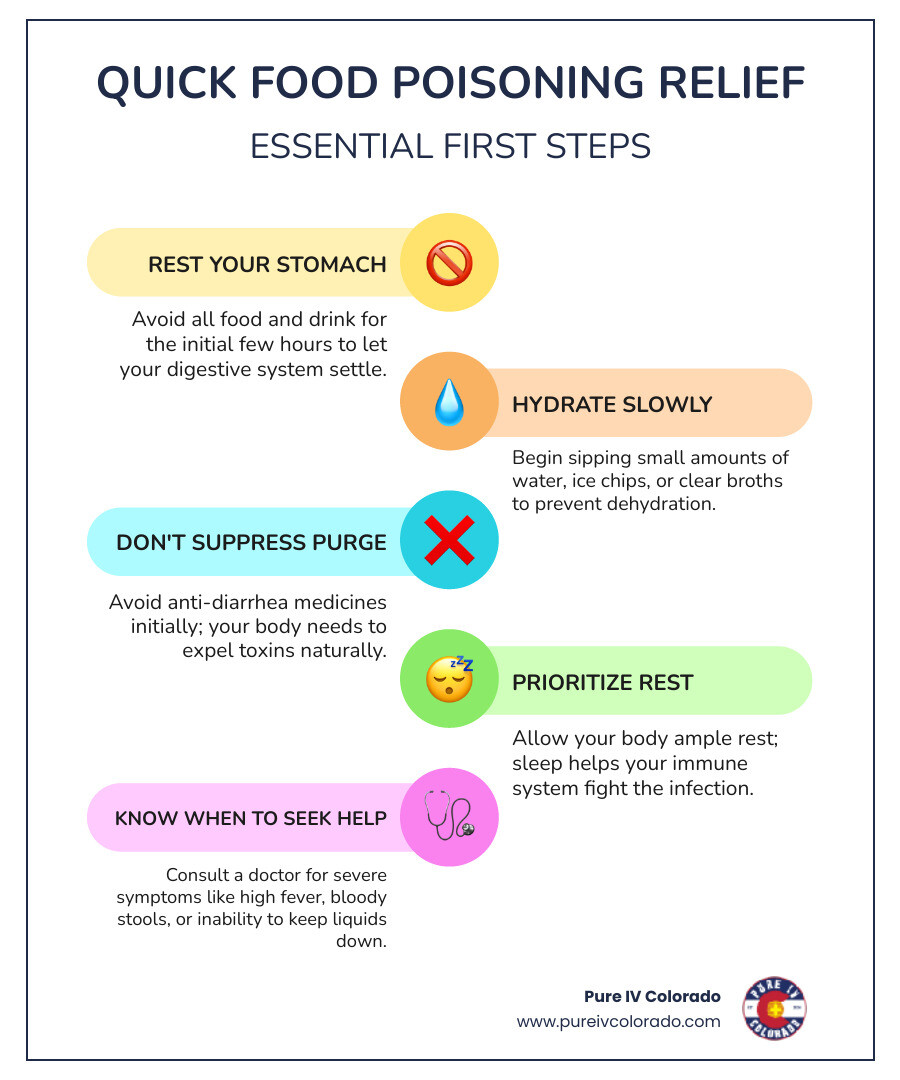
Immediate Steps for Quick Food Poisoning Relief
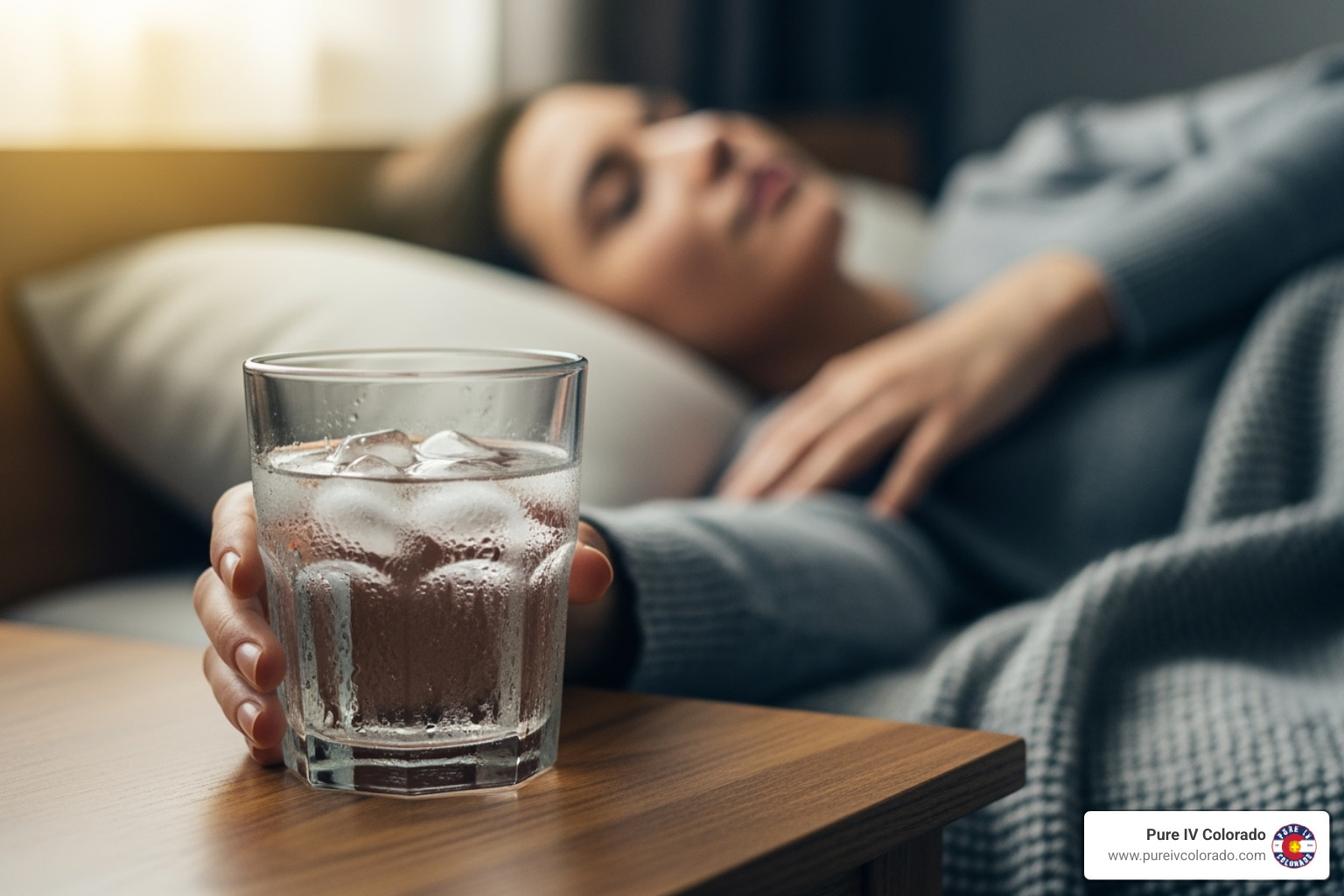
When food poisoning hits, your body feels like it's in full revolt. The first few hours are crucial for setting yourself up for quick food poisoning relief . I know it's miserable, but your body actually knows what it's doing right now.
Let your stomach settle by avoiding all food and drinks for the first few hours. I know this sounds scary when you're already feeling weak, but your digestive system needs this break. Think of it as hitting the reset button - your stomach is working overtime to get rid of whatever made you sick.
The hardest part? Fighting the urge to "fix" everything immediately. Avoid anti-diarrhea medicine initially because, as unpleasant as it is, diarrhea is your body's natural purge system. You don't want to trap the bad stuff inside. Trust me on this one - let your body do its job.
Get plenty of rest during this phase. Your immune system is fighting a battle, and it needs all the energy it can get. Find a comfortable spot near the bathroom (you know why) and just focus on breathing through the waves of nausea.
First-Line Hydration Strategy
Once you can keep small amounts down - usually after 2-4 hours - it's time to prioritize hydration . This is where many people make mistakes that slow their recovery.
Start with clear liquids like water , decaffeinated tea , or broth . Sip water slowly - tiny amounts every few minutes. If plain water feels too harsh, try sucking on ice chips . They're gentler and help you hydrate gradually.
Electrolyte drinks become your best friend once you can tolerate more fluids. Your body has lost important minerals through vomiting and diarrhea. For severe dehydration that needs faster intervention, you can learn more about restoring hydration through professional treatments.
Here's what to skip: avoid sugary drinks like soda or fruit juice - they can actually make diarrhea worse. Avoid caffeine and avoid alcohol completely. Both will dehydrate you further, which is the last thing you need right now.
A Note on Dental Care After Vomiting
Nobody talks about this, but stomach acid can seriously damage your tooth enamel when you're vomiting. I learned this the hard way from clients who dealt with dental issues after severe illness.
Delay brushing your teeth for at least an hour after vomiting. Instead, rinse with baking soda water - mix a teaspoon of baking soda in a cup of water. This neutralizes the acid and protects your enamel from erosion.
It's a small thing, but when you're already feeling awful, the last thing you want is dental problems on top of everything else. For more details on protecting your teeth when you're unwell, proper oral care during illness can prevent long-term damage.
What to Eat and Avoid for a Faster Recovery
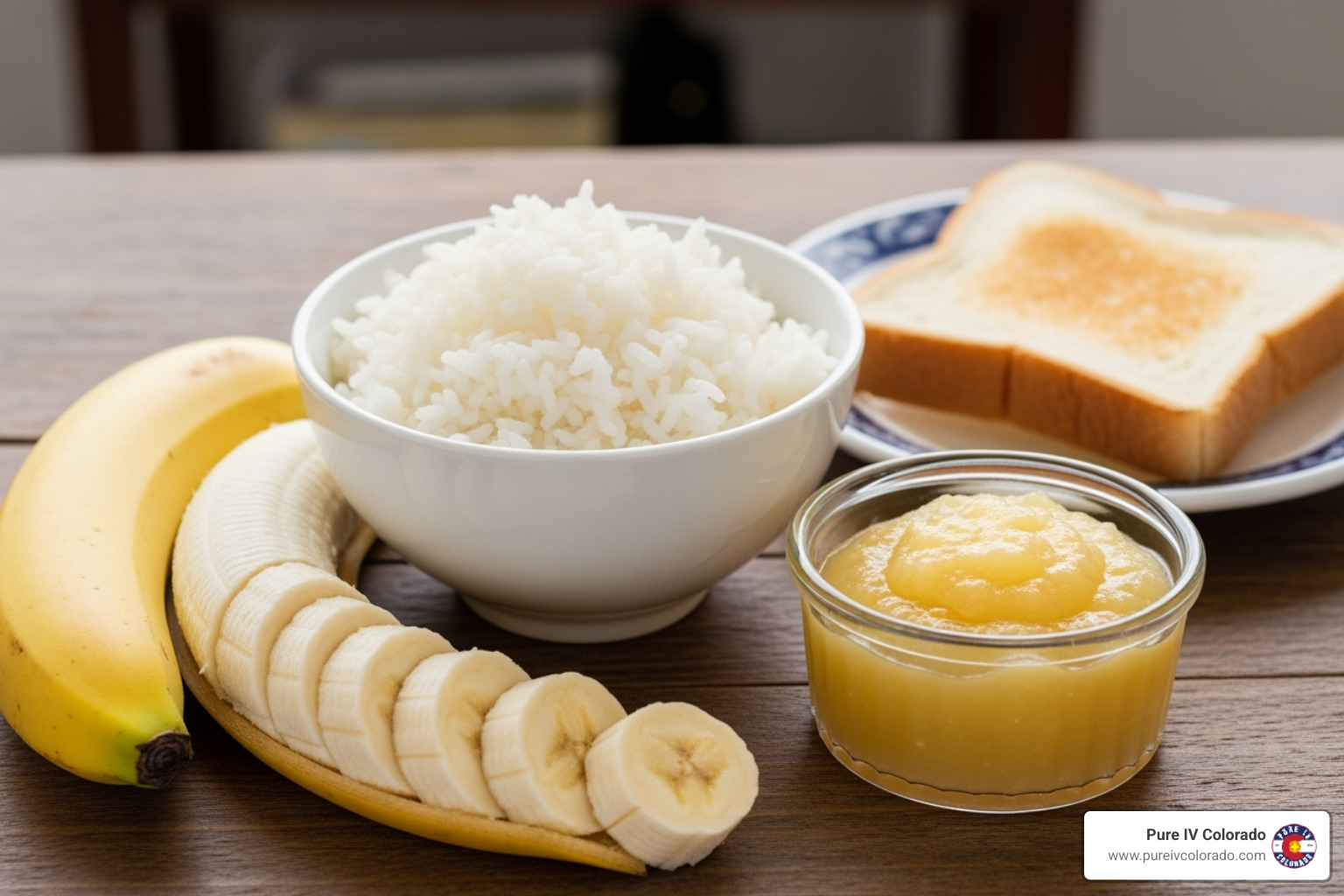
Phew! Once those initial, most intense food poisoning symptoms start to calm down and you feel a tiny flicker of improvement, it's time to gently think about food again. This stage is all about taking baby steps. The golden rule? Listen closely to your body. If something doesn't feel right, stop. Start with just a tiny bit, focusing on foods that are super bland, low in fat, and easy for your upset stomach to handle. This gentle approach is your secret weapon for truly achieving quick food poisoning relief .
Gentle Foods to Eat for Quick Food Poisoning Relief
When your tummy is feeling tender, reaching for plain, easily digestible foods is definitely the way to go. You've probably heard of the BRAT diet – and it's a classic for a reason! It stands for:
- B ananas: These are easy to digest, packed with potassium (which you often lose from vomiting and diarrhea), and can help firm things up.
- R ice: Plain white rice is low in fiber and gives you energy without upsetting your sensitive gut.
- A pplesauce: A gentle source of pectin, which can help bind your stools. Plus, it's easy to get down.
- T oast: Simple, dry toast (white bread is usually best at first) is gentle on your stomach and won't cause any surprises.
Beyond the BRAT basics, a few other comforting options include:
- Saltine crackers: These simple, salty crackers can help settle an upset stomach.
- Gelatin: Easy to digest, and it offers a little bit of calories and hydration.
- Oatmeal: Plain, cooked oatmeal can be wonderfully soothing.
- Boiled potatoes: Peeled and boiled, they offer calories and are very gentle on your digestive system.
Introduce these foods slowly, in small amounts, and gradually increase how much you eat as you start to feel better. For even more insights on what to eat and drink during your recovery journey, check out this helpful guide on What to Eat and Drink After Food Poisoning.
Foods and Drinks to Avoid
Just as important as knowing what to eat is understanding what to steer clear of. Certain foods and drinks can actually make your symptoms worse, drag out your recovery, and definitely hinder quick food poisoning relief . Our best advice is to avoid these completely until you're feeling completely back to normal:
- Dairy products: Things like milk, cheese, and most yogurts can be tough for your gut to handle when it's compromised. (Unless it's a specific probiotic yogurt recommended by a doctor.)
- Fatty foods: Say goodbye to fried foods, greasy meats, and high-fat snacks for now. They can easily trigger more nausea and diarrhea.
- Highly seasoned or spicy foods: Your inflamed digestive tract needs a break, so anything with a kick will likely just irritate it further.
- High-fiber foods: While fiber is normally great, during recovery, too much can be overwhelming for your sensitive gut and might worsen diarrhea.
- Nicotine: If you smoke or vape, try to avoid it. Nicotine can really upset your stomach.
- Caffeine: Coffee, most teas (unless they are decaffeinated herbal ones), and energy drinks can actually make you more dehydrated and irritate your gut.
- Alcohol: Alcohol is a double whammy – it's a diuretic (meaning it dehydrates you) and an irritant to your digestive system, making recovery much harder.
Giving your digestive system a much-needed break from these challenging items will allow it to truly heal and help you feel like yourself again much faster.
Natural Remedies and OTC Medications
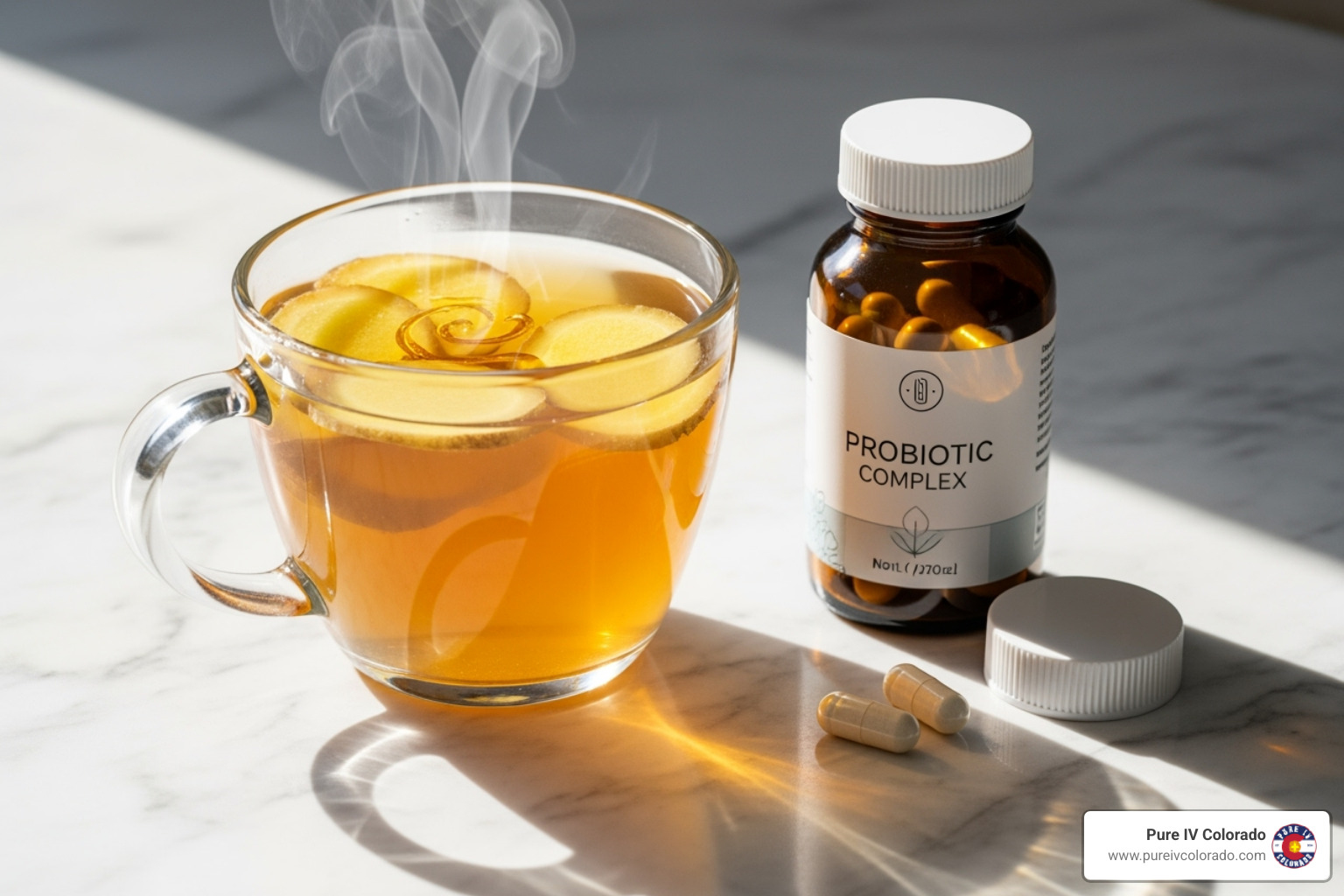
When you're dealing with food poisoning, you're likely looking for anything that can bring some comfort. While rest and staying hydrated are your core strategies for quick food poisoning relief , there are also some natural remedies and over-the-counter (OTC) medications that can help soothe your stomach, restore your gut health, and safely manage those uncomfortable symptoms. Our main goal is to help you feel as comfortable as possible during this challenging time. And for those moments when nausea is relentless and you just can't keep anything down, advanced solutions like IV therapy for nausea relief can deliver fast relief directly to your bloodstream.
Natural Home Remedies for Quick Food Poisoning Relief
Nature offers some truly gentle options that can provide a lot of comfort when your stomach is feeling upset.
First up is ginger tea . Ginger is well-known for its ability to calm an upset stomach and reduce nausea. It also has natural anti-inflammatory properties. Sipping on warm ginger tea can feel incredibly soothing. You can easily make it by boiling grated ginger in water and then straining it. Feel free to add a tiny touch of honey if your stomach can handle it. The National Center for Biotechnology Information shares more on how ginger is known to soothe the stomach.
Another great option is peppermint tea . Just like ginger, peppermint has special properties that can help relax your stomach muscles. This can be a huge help in easing cramps and nausea.
After a tough bout of food poisoning, the good bacteria in your gut can get seriously out of whack. That's where probiotics come in! These friendly bacteria can help bring your gut back into balance. You can find them in natural yogurt that has "live active cultures" or in capsule form. Taking probiotics can help your gut recover faster and might even shorten how long you have diarrhea. Consider taking probiotic supplements for at least two weeks after your symptoms go away to really help restore your gut's natural balance.
Safe Over-the-Counter Options
While we usually suggest letting your body naturally get rid of toxins, some over-the-counter (OTC) medications can offer relief from symptoms when used carefully.
Bismuth subsalicylate , often found in products like Pepto-Bismol or Kaopectate, can help reduce nausea, heartburn, indigestion, and diarrhea. It works by gently coating your stomach and intestines, and it even has some properties that fight bacteria.
Then there's loperamide , which you might know as Imodium A-D. This medication helps to slow down your bowel movements, which can reduce how often you have diarrhea. You can find more detailed information on medications like loperamide from reliable sources.
It's super important to be careful with these OTC medications. You should only use them with caution , and only if you have diarrhea that isn't bloody and you don't have a fever. If you have a fever or see any blood in your stool, avoid them entirely. Using them in those cases could actually trap harmful bacteria inside your system, making things worse.
Also, these medications are generally not for children . Loperamide isn't usually recommended for kids under 12 without a doctor's advice. Bismuth subsalicylate has an ingredient similar to aspirin, so it shouldn't be given to children under 12 or teenagers who are recovering from flu-like symptoms. This is because of a rare but serious condition called Reye's syndrome.
Always, always talk to your doctor or pharmacist before taking any OTC medication for food poisoning, especially if you have other health conditions or are already taking other medicines. Your health and comfort are our top priorities!
When to Seek Professional Medical Help
While most cases of food poisoning will resolve on their own with careful home care, there are definitely times when it's crucial to pick up the phone and reach out to a healthcare professional. Knowing these "red flag" symptoms and understanding when to call for help is super important for your safety and to prevent more serious complications. Delaying care in these situations can turn an uncomfortable experience into a truly dangerous one. We understand that figuring out when symptoms last too long can be tricky, which is why we're here to guide you.
Red Flag Symptoms You Shouldn't Ignore
Please, don't hesitate to contact a doctor or seek emergency care if you or someone you're caring for experiences any of these concerning signs:
First, keep a close eye on your temperature. A high fever of 102°F (39°C) or higher is a clear signal that your body is fighting a significant infection and needs medical attention. Similarly, if you're experiencing frequent vomiting and simply cannot keep any liquids down for an extended period, this is a serious concern because it can quickly lead to dangerous dehydration.
Another urgent symptom to watch for is any sign of blood. This includes bloody vomit or stools , or stools that appear black and tarry. Any presence of blood indicates a more serious issue that requires immediate medical evaluation.
Severe dehydration is one of the biggest risks with food poisoning. Look out for signs like feeling dizzy or lightheaded, having a very dry mouth and throat, sunken eyes, extreme thirst, or little to no urination (or very dark urine). For infants, this might look like no wet diapers for 3 hours or more. If you're in severe pain, such as extreme abdominal pain or cramping that just doesn't ease up, that's another reason to seek help.
In rare but serious cases, food poisoning can lead to neurological symptoms . These are unusual and include things like blurry vision, tingling or numbness in your limbs, muscle weakness, confusion, or difficulty speaking. If you notice any of these, get medical help right away.
Finally, certain individuals are at a much higher risk. If a baby or young child , an older adult (especially over 60), a pregnant person , or someone with a weakened immune system (due to conditions like HIV, cancer treatment, or chronic illnesses like diabetes or inflammatory bowel disease) develops food poisoning symptoms, they should see a doctor promptly, even if their symptoms seem mild. Their bodies are simply less able to fight off infection and dehydration. And for adults, if diarrhea lasts longer than 3 days , it's definitely time to seek medical advice.
Advanced Relief for Severe Dehydration
When food poisoning leads to severe dehydration, simply drinking water might not be enough, or it might be impossible if you're still vomiting a lot. In these situations, intravenous (IV) fluids can be an absolute game-changer. IV hydration delivers fluids, electrolytes, and essential nutrients directly into your bloodstream, completely bypassing your upset digestive system. This means rapid rehydration and replenishment, often making you feel significantly better within just 30-45 minutes.
At Pure IV Colorado, we specialize in providing mobile IV therapy for food poisoning, bringing this advanced relief directly to your home. We serve Denver, Breckenridge, Broomfield, Boulder, Thornton, Westminster, Arvada, Lakewood, Centennial, Golden, Aurora, Littleton, Highlands Ranch, Castle Rock, and Colorado Springs. Our experienced critical care nurses can assess your needs and administer a customized IV drip to rehydrate you quickly and effectively, helping you achieve quick food poisoning relief without the need for a stressful trip to the urgent care or emergency room. Our IVs can even include anti-nausea medication like Zofran and stomach-soothing Pepcid to improve your comfort and recovery. Explore how our mobile IV therapy for food poisoning can bring relief right to your doorstep.
Frequently Asked Questions about Food Poisoning
We've gathered some of the most common questions we hear about food poisoning to provide you with clear, concise answers. Our goal is to help you understand this common illness better, so you can achieve quick food poisoning relief and feel better faster.
How long do food poisoning symptoms typically last?
It's a question on everyone's mind when they're feeling awful: "How long will this last?" The truth is, the duration of food poisoning symptoms can vary quite a bit. It really depends on the specific germ that caused your illness and how strong your body's defenses are.
Generally speaking, most food poisoning symptoms tend to last 12 to 48 hours . For many people, things start to look up within two to three days without needing special medical care. However, some germs can stick around a bit longer. For example, while norovirus usually passes in 12-48 hours, something like Salmonella might cause symptoms for 4-7 days, and E. coli can linger for 3-4 days. Even rarer, parasitic infections like Cryptosporidium could keep you down for 1-2 weeks. Knowing when to expect to feel better can certainly help ease some of the worry during recovery.
What are the most common causes of food poisoning?
Food poisoning, at its heart, is caused by eating or drinking something that's been contaminated with harmful bacteria, viruses, parasites, or toxins. Think of it as uninvited guests crashing your digestive system!
The most common culprits behind foodborne illnesses in the United States include:
- Norovirus , which spreads easily from person to person or through contaminated food and water, often leading to vomiting and diarrhea.
- Salmonella , commonly found in raw or undercooked poultry, eggs, and unpasteurized dairy products.
- Clostridium perfringens , which often lurks in beef, poultry, gravies, and pre-cooked foods not kept at the right temperature.
- Campylobacter , frequently found in raw or undercooked poultry, unpasteurized milk, and contaminated water.
- And Staphylococcus aureus , which can easily transfer from human skin (say, from someone not washing their hands properly) to foods like pastries, salads, and deli meats.
So, how does food get contaminated? It often comes down to improper handling. This can mean not cooking or reheating food enough to kill off those pesky germs, not storing food correctly (like leaving perishable items out for too long), or even cross-contamination , where germs from raw foods (like chicken) accidentally spread to ready-to-eat foods. Sometimes, it's just about someone handling food when they're sick or haven't washed their hands. And, of course, eating food past its 'use by' date is a no-no! Understanding these common sources and practices is a huge step in preventing future episodes. The CDC provides extensive information on common foodborne germs.
When should I see a doctor for food poisoning?
While it's true that most cases of food poisoning resolve on their own with a bit of rest and hydration at home, there are definitely times when you should pick up the phone and call a doctor right away. Your health and safety are paramount, and knowing when to seek professional help is a key part of quick food poisoning relief .
You should strongly consider seeing a doctor if you fall into any of these high-risk groups :
- Pregnant women , because food poisoning can pose risks to both mom and baby.
- Older adults , especially those over 60 or 65, as their immune systems might not be as robust.
- Young children , particularly infants and kids under five, who have developing immune systems and are very prone to dangerous dehydration. If you even suspect food poisoning in a baby or young child, please contact a doctor promptly.
- People with weakened immune systems , which includes individuals with chronic conditions like diabetes, kidney disease, or inflammatory bowel disease, or those on medications that suppress their immune system (like during cancer treatment or for HIV).
Beyond these groups, watch out for these severe symptoms that are red flags:
- A high fever of 102°F (39°C) or higher.
- Frequent vomiting where you just can't keep any liquids down, leading to severe dehydration.
- Any sign of bloody vomit or stools (red or black/tarry stools), which points to a more serious issue.
- Clear signs of severe dehydration , such as dizziness, lightheadedness, a very dry mouth and throat, sunken eyes, extreme thirst, or little to no urination (or very dark urine).
- Extreme pain or cramping in your belly that just won't ease up.
- Neurological symptoms like blurry vision, tingling or numbness, muscle weakness, confusion, or trouble speaking. These are rare but can signal serious complications.
Finally, if your symptoms don't start to get better after two or three days, or if diarrhea lasts longer than 3 days, it's definitely time to get medical advice. For more detailed information on people at higher risk of complications from food poisoning, refer to the CDC's guidelines.
Conclusion
Facing a bout of food poisoning is never fun, but as we've explored, getting back on your feet quickly is absolutely possible when you give your body the right support. The good news is that quick food poisoning relief is truly within reach.
Throughout this guide, we've highlighted the cornerstones of recovery:
- Hydration is crucial: Especially here in Colorado, replacing lost fluids and electrolytes is your top priority.
- Rest is essential: Giving your body ample rest allows your immune system to do its vital work of fighting off the infection.
- Gradual diet reintroduction: Starting with bland, easy-to-digest foods and slowly reintroducing others helps your digestive system heal.
Always remember to listen to your body . It's your best guide for when to eat, what to drink, and how much rest you need.
While home remedies and careful self-management are often enough, it's equally important to recognize the signs that warrant professional medical attention. Please don't hesitate to seek help for severe symptoms, especially if you or a loved one falls into a high-risk group. Your health and safety come first!
If you find yourself battling severe dehydration or simply need to feel better fast, our mobile IV therapy services are designed to bring advanced relief directly to your doorstep. We’re here to help you get back on your feet quickly and comfortably, right where you are.
Ready to explore how we can help you feel your best? You can learn more about our IV treatments for food poisoning and let us support your recovery.
